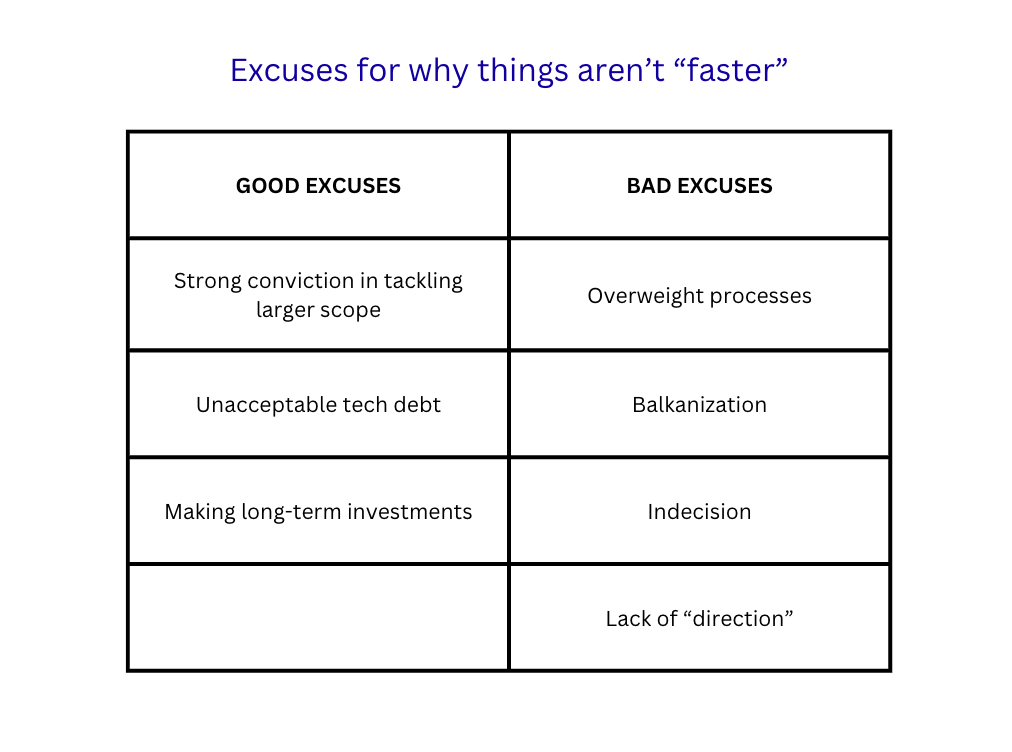Hiring more people and doing more projects does not mean you're moving faster
Commonly held misconceptions about what it actually means to move fast
Wow, it has been months since I’ve written a blog! I just started a new job in the beginning of this year, and it has been a bit time-consuming, but my new year’s resolution is to get back at it. So… I’m back! I’ve missed writing these posts and am looking forward to writing more!
At almost every company I’ve ever been at, I am constantly met with this refrain when confronted with a trade-off: can’t we do both?
Well, absolutely we could do both.
We could hire ten more people and have them all work on ten different projects. And since hopefully we hire responsible workers, we’ll make progress on all of them. But this doesn’t mean we actually FINISH projects any faster.
My co-founder once drew me this graph that he found from somewhere that I thought explained this really well.
Essentially, people often think that doing more means you’re doing it faster. But that’s not always true. You might be able to add a person to the same project and have that project finish faster, in exchange for delaying the start of another project. But once you get to that project, you’ll have more resources to finish that project faster. So ultimately, although you’re working on fewer things at a given time, you actually finish things faster.
And the beauty of finishing a project faster is that you can learn faster. Especially early on at a startup, it’s often better to finish and learn within a month, than to do 10 projects that all finish at the end of the quarter.
On the flip side, there’s also this misconception that somehow hiring more people will make projects move faster, and this is similarly not true. Projects can only be broken down into a limited number of independent tasks, and more people can actually make things run slower!
Having now worked at 4 startups, I’ve seen this time and time again. When things aren’t moving fast enough, the natural inclination is to either do more things or hire more people. But like I said earlier, these two toggles are deceiving when it comes to moving fast.
Usually, there’s some other underlying reason why things aren’t moving faster. Sometimes, there are good reasons for the speed you’re operating at. But most of the times, there are really bad reasons why you aren’t moving faster.
Below is a non-comprehensive list of reasons I’ve seen teams give when things aren’t moving fast enough. Let’s start with what I consider good excuses.
Good Excuses
Strong conviction. Sometimes, you really do know what needs to happen, and that MVP bar is higher than you’d like. Products like Notion or Airtable come to mind when I think about this. Or the many startups who have failed to try to replace Salesforce. You need a lot of surface area to make something that people truly love. If you have the conviction, it makes sense to tackle that large scope (but you better be sure you’re right or else you’ll be here ten years from now with nothing to show for it).
Unacceptable tech debt. If you’re paying for tech debt day in and day out, it’s worth it to pay that debt forward now to speed things up later.
Long-term investments. Startups can sometimes be blinded by short-term thinking because they are just trying to survive. And at times, investing in long-term wins is worth slowing down a little.
Bad Excuses
Onto my favorite… bad excuses!
Overweight processes. People often try to use process to solve too many problems. For example, I’m going to set up a process to double check someone’s work. Really, the solution is to not have to double check that person’s work so much.
Balkanization. This is a term I learned during my first startup job. It was used to describe when department or team lines are drawn too clearly, and people prefer NOT doing something over crossing lines. This might be okay at a big company, but it’s a startup killer. People waiting around for other people do things rather than doing it themselves slows things down A LOT.
Indecision. Startups are full of confusing situations. Better to decide and do something than to sit around changing your mind all day long.
Lack of “direction”. Ending with my favorite one. I can’t even tell you how many times people tell me they aren’t sure what to work on because they don’t know what the direction should be. It’s when the direction is unclear that moving fast is even MORE important. How else will you learn?
In all honestly, you’re probably never moving fast enough. And there are probably things you could optimize to move even faster. But as long as you’re achieving the outcomes you’ve set out to achieve, you’re probably fine. However, if you’re failing to achieve outcomes, don’t just assume bringing on more people or forcing the people you have to do more projects will make things faster. Take a look at the good excuses and bad excuses list. Are you hearing a lot of bad excuses? What do you need to do to change that?
Happy building!





